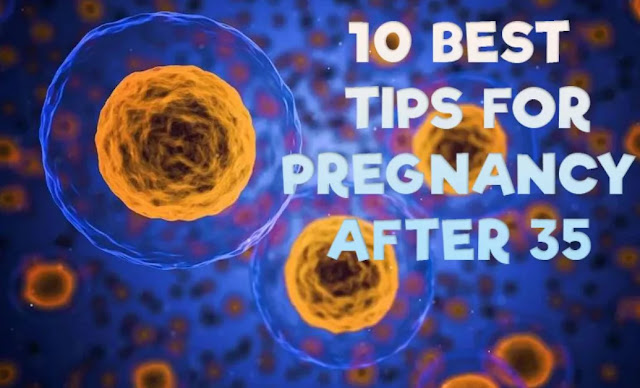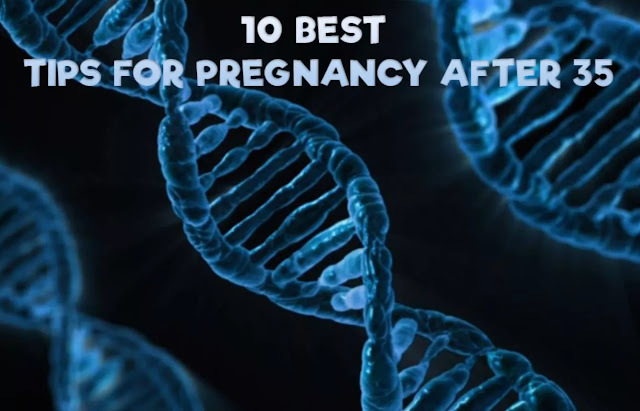10 Best Tips for Pregnancy After 35

Whether you’re trying to have a baby after 35, or not yet there but thinking about the future,
here are ten tips about pregnancy after 35.
1-It’s to Better to Understand the Risks of Pregnancy After 35
As women get older, they face an increased risk of pregnancy-related complications. So, you should know what are the health risks of pregnancy after 35.* Fertility Decline
Females are born with a limited number of eggs. As females grow older, the likelihood that they will have a baby reduces because of the declining number of remaining eggs and their reduced quality.

As women reach mid- the too late 30s, their eggs decrease in quantity and quality. Also, eggs of older women aren't fertilized as easily as ones of young women. So, it might take longer to get pregnant after 35.
* Women Having Pregnancy After 35 are More Likely to Have Conditions.
It’s more likely to develop gestational diabetes, which occurs only for the period of pregnancy,
and it is more common as women get older. Control of blood sugar through diet and physical activity is vital.
Gestational diabetes, if left untreated, can cause a baby to grow larger than average — which increases the risk of injuries during birth. Also, gestational diabetes can increase the risk of premature birth, high blood pressure through pregnancy, and complications to your baby after delivery.
and it is more common as women get older. Control of blood sugar through diet and physical activity is vital.
Gestational diabetes, if left untreated, can cause a baby to grow larger than average — which increases the risk of injuries during birth. Also, gestational diabetes can increase the risk of premature birth, high blood pressure through pregnancy, and complications to your baby after delivery.
* Needing a C-section.
Older mothers have a higher risk of complications related to pregnancy after 35 that might lead to a C-section delivery.
* Genetic Risks of Pregnancy After 35
Having babies in older age have a higher risk of certain chromosome problems, i.e.
the risk of chromosome abnormalities is higher. For example, the rate of having a baby with Down syndrome increases with maternal age.
the risk of chromosome abnormalities is higher. For example, the rate of having a baby with Down syndrome increases with maternal age.
* Miscarriage
The risk of pregnancy loss increases when women get older, possibly due to pre-existing medical conditions.
The decrease in the quality of the eggs, joint with an increased risk of chronic medical conditions such as high blood pressure and diabetes, could increase the risk of miscarriage.
The risk of miscarriage increases gradually with the mother's age. The declining quality of women's eggs is thought to be the reason for the higher rates of miscarriage.
Also, you can read Is it difficult to get pregnant late?
2-Increase Your Chances of Having a Baby
If a woman was over 35 and generally healthy, her pregnancy should be healthy too. Traditionally 35 and older is supposed to be a high-risk age for pregnancy. If you eat healthily, do exercises, don’t smoke and have a healthy weight, your odds of having a baby increases dramatically.3- Have Preconception Checkups and Counseling.
When you decide that you are ready to have a baby, it is crucial to take some steps before conception.Go to your doctor for a checkup to make sure you are healthy prior to conception.
Talk to him to assure that you are emotionally prepared to have a baby.
The doctor can answer questions about your pregnancy diet, safe exercise, and any environmental factors to avoid for the next few months.
4-Getting Early and Regular Prenatal Care.
The first 8 weeks of your pregnancy are very vital to your baby's development.Early and regular prenatal care can increase your odds of having a safe pregnancy and a healthy baby.
Getting prenatal care also provides additional protection for women over 35.
It allows your health care provider to stay ahead of health conditions that are more common with older pregnant women.
5-Considering Optional Prenatal Tests for Women Who’s Having Pregnancy After 35.
Your doctor may offer you special prenatal tests that are particularly applicable to older mothers.These tests help determine the risk of having a baby with a defect.
Ask your doctor about these tests so you can learn the risks and benefits and decide what's best for you.
6-Take Vitamins.
All women of pregnancy age should take a daily prenatal vitamin containing at least 400 micrograms of folic acid.Getting enough folic acid every day before and during the first 3 months of being pregnant can help prevent defects involving a baby's brain and spinal cord.
Do not take more than 1,000 mcg (1 milligram) of folic acid without consulting your doctor.
7- Talking to Your Doctor.
Talk to your doctor if you don’t get pregnant within six months. Time is so important after 35.That’s why it’s really important you don’t delay seeking help if you can’t conceive after six months.
It may seem strange to get help quickly whenever you know that your age naturally decreases your monthly fertility odds.
Even so, it’s better to get fertility tests after just six months of trying if you’re 35 or older.
If there is a fertility problem, you will be more likely to succeed in treating it sooner than later.
Your doctor may suggest you continue trying to conceive naturally for another few months if there are no obvious fertility problems and return if you still don’t succeed.
You should talk to your doctor about how you can have the best pregnancy for you and your baby and what you can do to lower your risk of complications.
Also, you can read Top 10 Questions About Having a Baby at 40
8- Healthy Choices Should Be Made When You’re Having Pregnancy After 35.
Don’t assume your age is the only cause you’re not conceiving quickly.When you are over 35, you already have your age working against you.
It just makes good sense to make sure that the factors you can control are working for you.
Healthy living can help boost your odds of having a baby.
These are some steps to have a healthy pregnancy:
- Reduce your caffeine.
- Make sure you are at a healthy weight—neither under nor overweight.
- Have a healthy diet. During pregnancy, you will need more folic acid, calcium, iron, vitamin D and other necessary nutrients.
- Exercise regularly.
- Avoid any substances, including drugs, smoking, and alcohol.
- To help you with stress, don’t forget about mind-body therapies.
Eating healthier, dropping fertility-busting habits, and keeping a healthy weight may not only help you conceive faster but can also increase your chances for fertility treatment success.
9- Asking for Help and
If you are over 35 and you have been trying to have a baby for six months or more, you should see a doctor. There are many choices available for women who are having trouble getting pregnant. But the treatment depends on the cause.First, you and your partner would have some fertility tests, which might include sperm tests, checking for sexually transmitted infections, and an ultrasound.

Then, depending on the results, your doctor may suggest treatments such as hormone therapy and artificial insemination. These treatments can all work but they are not guaranteed.








